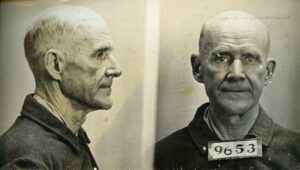Jack Gantos is currently one of the most successful writers of juvenile fiction, and has authored over a dozen Rotten Ralph books, including two well-received novels on his hometown of Norvelt (one of which won the Newberry Award). Gantos is known for being able to speak directly to his audience through text, but he wasn’t always a great writer—his upbringing was marked by an unending amount of struggle, conflict, and victory.
Jack realized in high school that he still wasn’t the writer that he wanted to become (this was the late 1960’s). “During my junior year my parents moved to San Juan, Puerto Rico. My dad had a lifelong habit of switching jobs almost every year…”1 Although he had been writing for years before he even started high school, his efforts simply didn’t match his grand expectations. “I started writing when I was in second grade. I kept journals and wrote in them obsessively about everything I saw and felt and wondered. I wrote about kids I knew. I remembered conversations I’d heard and put those in my journal.”2
As he continued his education in high school, he ultimately ended up in Florida for his senior year because he didn’t speak Spanish well enough to attend the public high school in Puerto Rico. Although he knew he wanted to be a writer, he couldn’t get into the creative writing course in Florida because his high school required him to have had straight A’s in eleventh grade English, something he could not have accomplished with the family moving so often. He gave up on his high school preparing him to become a writer, and tried being organized and becoming an author on his own.3 He even applied to the University of Florida at Gainesville but found the school lacking when it came to teaching creative writing (he found this out during an on campus visit during his senior year of high school).
After graduating from high school, Jack decided to postpone college and work for his father in St. Croix, an island in the Caribbean, in order to save up for college. While working to collect the funds, Jack found himself associating with members of the local medical school, and, through them, he quickly learned about high quality marijuana, as well as learning more about his capabilities as a writer. As he spent more and more time with the community, he began to learn about the insides of the drug trade, information that would eventually benefit him in the long run.4
Things were not going swimmingly in St. Croix, and the situation began to worry Jack and his friends. Racial unrest was boiling, and white people quickly began fleeing the island, shipping their possessions back to the United States. Jack and his father decided to capitalize on the social unrest, and kept busy by building crates for a profit. One day, a man arrived and wanted a special crate built. Jack’s father immediately pegged him as a dope dealer, but Jack didn’t care. Behind his father’s back, he took the guy’s money for the “special order” false-bottom crate. Jack didn’t know it then, but this seemingly small scheme would jump-start his entire career. When the special crate was finished, Jack was offered ten thousand dollars to help sail the cargo in the bottom of the crate (2000 pounds of hashish) to New York and help sell it. Jack spent time pondering his position, but ultimately saw the money as his tuition to college and the voyage as his way off of the island that he felt trapped on.5 Once he made up his mind, there was no changing it.

After some mishaps at sea, (including nearly floundering in St. Croix harbor and almost getting stranded high and dry in Cape May, New Jersey) the sailboat finally arrived in New York City. Stepping off the boat, Jack began to feel uneasy about the trip, and simply wanted his cash in order to quickly get out of the city. Luckily, he got the cash without complication, and quickly ventured out into the street, filled with plans for college. After only one day in the “Big Apple,” however, he was betrayed by the man he had sailed with from St. Croix to New York. He feared the federal drug enforcement people were closing in, and he was subsequently forced to leave New York. With some effort, Jack managed to flee and ultimately return to Fort Lauderdale.6
Only a few days later, Jack would eventually find out that the shipment of hashish was part of an international smuggling operation and that the FBI had traced it all the way from St. Croix to New York. They had wiretapped the phones, and already knew of Jack’s daring escape. The chase was on.7
Jack was a bright and resourceful guy, and he was also pretty honest with himself, so he recognized that the life of a drug smuggler was not something that he wanted to pursue. So, when the FBI eventually caught up with him, he began hoping for a minimal sentence. When the day came for him to appear in court for sentencing, Jack took the remains of his money, gave it to his lawyer for safekeeping, and proudly stepped into court. The federal attorney fought hard, and the judge eventually sentenced Jack to five years in a medium security prison in Kentucky. His father was there and had already acted like an asshole himself, crashing Jack’s car and collecting the insurance and pocketing it.8
Jack was, in every sense of the word, a model prisoner. He decided to use his time in prison to improve his writing and storytelling skills, and the time passed rather quickly. Eventually, he lucked out and was assigned to the prison hospital for good behavior. As he was lucky enough to be out of the general, and dangerous population, he always took care to treat his fellow prisoners with respect and courtesy. Jack became something of a prison celebrity, and even impressed the guards enough to receive a parole hearing. Despite all of his efforts, however, his early release was rejected because the FBI was still chasing the hashish and, due to his lack of information on the subject, they labeled him uncooperative.9
What did Jack learn, and how did he get out? In his own words, he claimed that “In prison I got a second chance to realize I did have something to write about. I found plenty of serious subjects. I had plenty of time to write about them…and I found so much more to write about…My struggle as a writer was much like my life I figured.”10 After a year in prison, Jack got a new rehabilitation worker whom he sold on the idea of college after incarceration, and they submitted a proposal to the parole board, asking them if they might consider early parole. Due to his outstanding behavior, the board bought it, and Jack was released, with conditions, only fifteen months into his sentence.11

Jack went on to receive both a BFA and an MA from Emerson College in Boston. During that time, he began to work on picture books with Nicole Rubel, and their books series, Rotten Ralph, was born in 1976. In 2012, Jack won the Newbery Medal for one of his novels, Dead End in Norvelt. Dead End also won the 2012 Scott O’Dell Award for Historical Fiction and even made the Guardian Prize longlist in Britain. His 2002 memoir Hole in My Life was a runner up for the ALA Printz Award. Previously Jack was a finalist for the U.S. National Book Award and a finalist for the Newbery Medal for two Joey Pigza books.12
- Jack Gantos, Hole in My Life (New York: Farrar, Strauss & Giroux, 2002), 9. ↵
- “Writing What I Know & Finding Joey Pigza,” Scholastic, accessed March 19,2019, https://www.scholastic.com/teachers/authors/jack-gantos ↵
- Jack Gantos, Hole in My Life (New York: Farrar, Strauss & Giroux, 2002), 20-23. ↵
- Jack Gantos, Hole in My Life (New York: Farrar, Strauss & Giroux, 2002), 42-48. ↵
- Jack Gantos, Hole in My Life (New York: Farrar, Strauss & Giroux, 2002), 59-71. ↵
- Jack Gantos, Hole in My Life (New York: Farrar, Strauss & Giroux, 2002), 99-110, 113-118. ↵
- Jack Gantos, Hole in My Life (New York: Farrar, Strauss & Giroux, 2002), 121-131. ↵
- Jack Gantos, Hole in My Life (New York: Farrar, Strauss & Giroux, 2002), 141-153. ↵
- Jack Gantos, Hole in My Life (New York: Farrar, Strauss & Giroux, 2002), 155-174. ↵
- Jack Gantos, Hole in My Life (New York: Farrar, Strauss & Giroux, 2002), 186. ↵
- Jack Gantos, Hole in My Life (New York: Farrar, Strauss & Giroux, 2002), 190-194. ↵
- Jack Gantos website, accessed March 14,2019, http://www.jackgantos.com/books. ↵




16 comments
Christopher Metta Bexar
I’m visiting my own article to see if anything has changed about the way I would write it coming at it from having read more Jack Gantos.
He’s still an example of how to become a great writer by knowing what you know best. In his case his growing up.
His award winning books are all based upon him. His Newberry winner is autobiographical, so are his best selling Joey Pigza books.
My article succeeded because I stuck to the authority on Jack Gantos, himself,not a biographer.
Hamza Bourouz
This is a truely amazing article, a great story with a twist. It is unfortunate however, that Jack had to work with a drug dealer so he can get the money to pay for college. coming from a country where higher education is free his story is so inspirational because in a lot of countries where higher education is fre students take it for granted and often ignore how lucky they are.
Michael Hinojosa
This was an amazing article I enjoyed reading from start to finish! As someone who wants to be a writer himself I was drawn to this article the second I laid eyes on it, despite not knowing too much about Jack Gantos personally other than some of his own original work. All of the stuff he did just to reach his end goal was a wild ride from start to finish too! One wouldn’t consider having to smuggle drugs and go to jail a necessary step to get to your end goal.
Rosario Moreno
Jack had the writing skills all along, all he needed was a wake-up call. I really enjoyed your article, I felt that he had a lot of twists and turns in his life that led him to be the phenomenal writer he was today. I wonder if his relationship with his father ever got better, I liked how you included the part about the car. Good job!
Vanessa Sanchez
Great article, I have personally never heard of Jack Gantos and it was really interesting learning about him. Its interesting how he was ever really much of a good writer since in his high school years he infact struggled. The things he had to go through just to accomplish his goal is insane. The idea of him having to snuggle drugs in New York just so that he can pay for school. That is insane! The experience did sure stick to him leading him for future novels.
Nadia Carrasco
I really enjoyed this article. What I found most interesting was Jack’s mentality. Jack came off to me like a normal guy who was only trying to get college paid. There are many other college students that would have done the same thing in his situation. Unfortunately this did not go the way he planned it. Although Jack did end up in prison he gained inspiration from the people he was surrounded by and started writing.
Tyler Reynolds
I liked the article but I wished there was more to the story. Just like Jack I sometimes have difficulty generating stories and essay that match my own expectations. Sometimes I get so preoccupied and overwhelmed with the prospect of the task that I postpone it to the last minute until I have to finish it, knowing that I could have done better.
Chelsea Alvarez
This story is a very inspirational one, because it presents the life of an individual who had an upbringing that wasn’t the greatest. His passion to write is what ultimately led him to find a way to express himself. I was very touched when I read that he had saved up his money in efforts to fund his own education. That really shows how much he truly aspired to attain his goal of becoming a writer. Although he ended up in prison, he did not let that part of his life steer his ambition away. He used that as his driving force to continue to reach his dreams.
Ruby Wynn
This is an excellent article. He was clearly dedicated to his dream of becoming. He started writing when he was in second grade and continued, even with a bad high school education due to moving every year, and felt he had to smuggle drugs to pay for college. It is unfortunate that he accepted the job of helping smuggle the drugs, but his time in prison seemed to be an important step on his path to writing books that impact the youth of today.
Fatima Navarro
Life lesson is that we can reinvent ourselves, we can have a second chance and not waste it. I liked how it did not only show the struggle of becoming a writer, but also the lack of support which eventually led him to be in prison for a while. Yet, Jack Gantos did not give up and instead made something negative into something positive that at the end rewarded him tenfold.